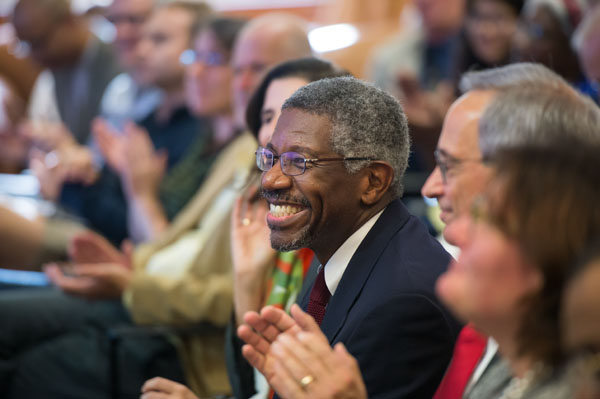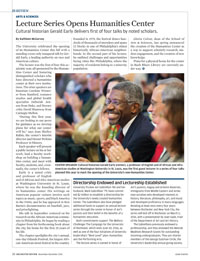In Review
 CENTER SPEAKER: Cultural historian Gerald Early (center), a professor of English and of African and Afro-American studies at Washington University in St. Louis, was the first guest lecturer in a series of four talks planned this year to mark the opening of the University’s new Humanities Center. (Photo: Adam Fenster)
CENTER SPEAKER: Cultural historian Gerald Early (center), a professor of English and of African and Afro-American studies at Washington University in St. Louis, was the first guest lecturer in a series of four talks planned this year to mark the opening of the University’s new Humanities Center. (Photo: Adam Fenster)The University celebrated the opening of its Humanities Center this fall with a standing-room-only inaugural talk by Gerald Early, a leading authority on race and American culture.
The lecture was the first of four this academic year, all sponsored by the Humanities Center and featuring distinguished scholars who have directed a humanities center at their own institutions. The other speakers are historian Caroline Winterer from Stanford, romance studies and global health specialist Deborah Jenson from Duke, and literary critic David Shumway from Carnegie Mellon.
“During this first year, we are looking to our peers for guidance as we develop plans for what our center will be,” says Joan Shelley Rubin, the center’s interim director and Dexter Perkins Professor in History.
Each speaker will present a public lecture on his or her work, lead a faculty workshop on building a humanities center, and meet with faculty, students, and, eventually, the center’s fellows.
Early is a noted critic and professor of English and of African and Afro-American studies at Washington University in St. Louis, where he was the founding director of its humanities center. His writings on American popular culture involve such topics as music, sports, and black America in the 1960s, and he has appeared in Ken Burns’s documentaries on baseball, jazz, and prizefighting.
His talk in September centered on his research on the African-American community in Philadelphia. He began by reading a chapter from his forthcoming book about the city, his home for the first 25 years of his life.
The chapter spotlights the city’s annual, one-day Odunde Festival, the largest African-American street festival in the country. Founded in 1975, the festival draws hundreds of thousands of attendees and spans 12 blocks in one of Philadelphia’s oldest historically African-American neighborhoods. In the second part of his lecture, he outlined challenges and opportunities facing cities like Philadelphia, where the majority of residents belong to a minority population.
Gloria Culver, dean of the School of Arts & Sciences, last spring announced the creation of the Humanities Center as a way to support scholarly research, student engagement, and the creation of new knowledge.
Plans for a physical home for the center in Rush Rhees Library are currently under way.
Directorship Endowed and Lectureship Established
University Trustee Ani Gabrellian ’84 and her husband, Mark Gabrellian ’79, have committed $2 million to establish a directorship for the University’s newly created Humanities Center. The Gabrellians also have pledged additional funds to support an annual lecture series through the center in honor of Ani’s parents and their belief in the benefits of a humanistic education.
Both commitments support The Meliora Challenge: The Campaign for the University of Rochester, which ends June 30, 2016, as well as one of the four initiatives of University leadership’s “Next Level” plan: Humanities and the Performing Arts.
The lecture series is named in honor of Ani’s parents, Hagop and Artemis Nazerian, immigrants from Middle Eastern and Armenian societies who developed interests in history, literature, philosophy, art, and music and developed proficiency in many languages. Rotating at least once every four years between Rochester and New York City, the series will kick off in Rochester on March 2, 2016, with a presentation by Joan Saab, chair of the Department of Art and Art History.
The Gabrellians previously endowed a professorship, and they endowed the Mesrob Mashtots Research Grants for outstanding incoming undergraduates. They are charter members of the George Eastman Circle, the University’s leadership annual giving society.

